- Home
- John Jakes
North and South Trilogy Page 5
North and South Trilogy Read online
Page 5
Orry drew a deep breath. The other young man jumped down from the trunk. His fine clothes were hardly ruffled.
“I thank you very much for your assistance sir.” Orry’s politeness helped hide his nervousness in the presence of Yankees—and patently prosperous ones, at that.
The stocky young man grinned. “We almost had ’em whipped.”
Orry smiled too; The newcomer stood just about to his shoulder. Although there was no fat on him, he gave the impression of being very wide of body. His face was shaped like a wide U. He’d lost his hat, and his brown hair, lighter than Orry’s, showed several blond streaks bleached by the sun. The young man’s pale, ice-colored eyes were saved from severity by a good-humored sparkle. His smile helped, too, although anyone who disliked him no doubt would have called it cocky.
“So we did,” Orry replied, perpetuating the lie.
“Nonsense,” said a stout, pasty man three or four years older than Orry’s benefactor. “Both of you could have been injured or killed.”
The stocky lad spoke to Orry. “My brother never does anything more dangerous than trimming his nails.”
The woman who had cried out, stout and fortyish, said, “George, don’t be saucy to Stanley. He’s right. You’re far too reckless.”
It was a family, then. Orry touched his hat brim. “Whether we won or lost, all of you helped me out of a tight spot. My thanks again.”
“I’ll give you a hand with that trunk,” George said. “You are taking this boat, aren’t you?”
“Yes, to the Military Academy.”
“Just get your appointment this year?”
Orry nodded. “Two months ago.”
“Fancy that,” George said, grinning again. “So did I.”
He let go of the broken rope handle. Orry’s quick jump saved his feet from being crushed by the trunk.
The other young man held out his hand. “Name’s George Hazard. I’m from Pennsylvania. A little town you’ve never heard of—Lehigh Station.”
“Orry Main. From Saint George’s Parish, South Carolina.”
They looked at each other as their hands clasped. Orry had a feeling this pugnacious little Yankee was going to be a friend.
A few steps away George’s father was berating the official who had stood by while a fight developed. The official loudly disavowed responsibility for the public pier. The elder Hazard exclaimed, “I’ve got your name. There’ll be an investigation, I promise you that.”
Scowling, he returned to his family. His wife soothed him with some murmured words and a pat or two. Then George cleared his throat and, with a mannerly air, made the proper introductions.
William Hazard was a stern, impressive man with a lined face. He looked ten years older than his wife, though in fact he was not. In addition to the parents and their two older sons, there was a sister, Virgilia—oldest of the children, Orry surmised—and a boy of six or seven. His mother called him William; George referred to him as Billy. The boy kept fiddling with his high collar, which brushed the lobes of his ears; all the men, including Orry, wore similar collars. Billy gazed at his brother George with unmistakable admiration.
“Since Stanley’s the oldest male, he’s going to take over the ironworks,” George explained as he and Orry carried the trunk onto the steamer. “There’s never been a question of his doing anything else.”
“Iron, you said?”
“Yes. Our family’s been making it for six generations. The company used to be called Hazard Furnace, but my father changed the name to Hazard Iron.”
“My older brother would be fascinated. Anything scientific or mechanical interests him.”
“Are you the second son also?” George’s father asked, coming aboard with the rest of the family.
“Yes, sir. My brother Cooper refused an Academy appointment, so I took it instead.” He said nothing more. There was no point in airing family quarrels; no point in telling strangers how Cooper, whom Orry admired, continually disappointed and angered their father with his independent ways.
“Then you’re the fortunate one,” Hazard Senior declared, leaning on his gold-knobbed stick. “Some say the Academy is a haven for aristocrats, but that’s a canard. The true nature of the Academy is this: it’s the source of the best scientific education available in America.” He punctuated each sentence with a kind of verbal period; the man spoke in pronouncements, Orry thought.
The sister stepped forward. She was an unsmiling girl of about twenty. Her squarish face was marred by a few pox marks. Her figure was generous, almost too buxom for her puff-shouldered, narrow-waisted dress of embroidered cambric. Gloves and a flower-trimmed poke completed her costume. Miss Virgilia Hazard said, “Would you be kind enough to repeat your first name, Mr. Main?”
He could certainly understand why she wasn’t married. “Orry,” he said, and spelled it. He explained that his forebears were early settlers of South Carolina and that he was the third member of his family to be called Orry; it was a corruption of Horry, a common Huguenot name pronounced as if the H did not exist.
Virgilia’s dark eyes challenged him. “Might I ask the nature of your family’s business?”
Instantly he felt defensive; he knew what she was after.
“They own a rice plantation, ma’am. Rather large and considered prosperous.” He realized his description was gratuitous and braggy; he was indeed on the defensive.
“Then I presume you also own slaves?”
No trace of a smile on his face now. “Yes, ma’am, more than a hundred and fifty. You can’t grow rice without them.”
“As long as the South perpetuates Negro slavery, Mr. Main, the region will remain backward.”
The mother touched her daughter’s arm. “Virgilia, this is neither the time nor the place for such a discussion. Your remark was impolite and un-Christian. You hardly know this young man.”
The sister blinked; it appeared to be the only apology Orry would get.
“Visitors ashore. Visitors ashore, please!” A bell rang stridently. George bustled around, hugging Billy, his mother, his father. He shook stuffy Stanley’s hand and merely said good-bye to Virgilia.
Soon the steamer was backing from its berth. The family waved from the pier. They dropped out of sight as the boat headed upstream. The two travelers stared at each other, realizing they were on their own.
George Hazard, seventeen, felt obliged to apologize to the young man from the South. George didn’t understand his older sister, though he suspected she was mad at the world because she hadn’t been born a man, with a man’s rights and opportunities. Her anger made her a misfit socially; she was too brusque to catch a beau.
The young Pennsylvanian didn’t understand his sister’s opinions, either. He had never thought much about slavery one way or another. It existed, although many said it should not. He was not about to damn this chap because of it.
The paddles churned the sunlit water. New York’s piers and buildings disappeared astern. George glanced sidewise at Orry, who in one way reminded him of Stanley. Think carefully first, and don’t act until you do. There was, however, a significant difference. Orry had a natural, genuine smile. Stanley’s smile was priggish and obviously forced.
George cleared his throat. “My sister was rude to say what she did.”
The moment he spoke he saw Orry’s shoulders stiffen. But the tone of the statement put the Southerner at ease. Orry asked, “Is she an abolitionist?”
“I don’t think so. Not an active one, anyway, although I guess she could be. Hope you don’t take her remarks too personally. I expect Virgilia would sass anyone from your part of the country. You’re probably the first Southron she’s ever run into. We don’t see many in Pennsylvania, and I can’t say I’ve ever met one myself.”
“You’ll meet plenty at the Academy.”
“Good. I’m anxious to know what they’re really like. I have this picture, you see—”
“What kind of picture?”
“Southerne
rs are people who eat pork and collards, fight with knives, and abuse their niggers.”
In spite of the way the description offended him, Orry managed to see the attempt at humor in it. “Each of those things is true about some Southerners, but it’s by no means true of all. That’s where misunderstandings arise, I reckon.” He pondered a moment. “I have a picture of a Yankee, too.”
George grinned. “I thought you might. What is it?”
“A Yankee’s always ready to invent some new thingamajig or to outwit his neighbor in court. He’s a pert sort who wants to sell you jackknives or tinware, but what he likes best is skinning you.”
The other burst out laughing. “I’ve met a couple of Yankees like that.”
“My father says Yankees are trying to run the country now.”
George couldn’t let that pass. “The way Virginia ran it for so many years?”
Orry gripped the varnished rail. “Look here—”
“No, look there.” George decided that if they were to be friends the subject should be changed posthaste. He pointed to the stern, where the two young female passengers were giggling under their parasols. The older woman with them had fallen asleep on a bench.
George had made love to two girls back home, thus felt worldly. “Shall we go talk to ’em?”
Orry turned pink and shook his head. “You go if you want. I’m not much for gallanting the belles.”
“Don’t like to?”
A sheepish admission: “Don’t know how.”
“Well, you’d better learn or you’ll miss half the fun in life.” George relaxed against the rail. “Guess I won’t talk to them either. I couldn’t conduct much of a romance between here and West Point.”
He fell silent, giving in at last to the anxiety that had been growing in him ever since he left home. His family would be staying on in the city, his father to transact some business, the others to enjoy the restaurants, museums, and theaters—while he traveled toward an uncertain future. A lonely one, too. Even if he survived the rigorous disciplines of the Academy, it would be two years before he saw Lehigh Station again. Cadets were granted just one leave, between their second and third years.
Of course he had to overcome a lot of obstacles before he became eligible for that little holiday. The academic work was reportedly hard, the deviling of plebes by upperclassmen harder still. The institution was frequently criticized for permitting hazing. The criticism usually came from Democrats who hated the whole concept of the place, as Old Hickory had.
As the steamer moved against the current, the palisades rose on either hand, green with summer leaves. There was no sign of human habitation on the bluffs. The vessel was carrying them into a wilderness. For that reason George welcomed the company of someone else fated to suffer the same uncertainties and, unless he guessed wrong, the same fears of what lay ahead.
2
THE STEAMER PROCEEDED NORTH into the Hudson Highlands. About one in the afternoon it rounded the point that gave the institution its more common name. Orry strained for a glimpse of the cadet monument to the great engineer, Kosciusko, on the bluff above, but foliage hid it.
As the boat maneuvered into the North Dock, the two young men had a breathtaking view of the Hudson gorge stretching north. Ancient glaciers had carved terraced mountainsides and created the peaks with which Orry had familiarized himself through reading. He pointed them out. Mount Taurus behind them on the east shore, Crow-Nest on the west, and, farther upriver, the Shawangunk range.
“Back there where we passed Constitution Island the Americans strung a chain and boom to hamper navigation during the Revolution. Fort Clinton stood up there on the point. It was named for the British general. The ruins of Fort Putnam are over that way.”
“Interested in history, are you?” George asked pointedly.
“Yes. Some of the Mains fought in the Revolution. One rode with Marion, the Swamp Fox.”
“Well, I suppose some Hazards fought, too. In Pennsylvania we don’t keep very close track of those things.” Testiness brought on by the heat and by their isolation had crept into George’s voice. He recognized that and tried to joke. “But now I understand why you haven’t time for girls. You’re always reading.”
Orry reddened. George held up his hand. “Don’t get me wrong. What you said is interesting. But are you always so serious?”
“What’s wrong with that? You’d better be serious too, if you want to last through your first summer encampment.”
George sobered. “Guess you’re right.”
The young female passengers waved good-bye as George and Orry left the steamer. The heat was intense now; George doffed his coat.
Two soldiers in uniform waited on the dock. One, rather oafish, leaned against a rickety one-horse cart. He wore a roundabout with brass buttons, trousers, and gloves—all white but not clean. On his head sat a flat round cap decorated with some kind of brass ornament. A big cutlass hung from a heavy belt.
Orry and George were the only arrivals. The crewmen hurled their luggage onto the dock without concern for the contents. While the newcomers gazed about them, the gangway was quickly drawn up. Bells rang, paddles churned, a whistle blast signaled departure.
The smaller of the two soldiers, clad in a somewhat cleaner uniform, clutched the hilt of his cutlass and strode forward. He too wore one of those round caps. He had a wrinkled face and addressed them with a distinct Irish brogue.
“Corporal Owens, United States Army. Provost of the post.”
“We are new plebes—” George began.
“No, sir!”
“What’s that?”
“You are a thing, sir. To be a plebe you must survive the entrance examinations. Until then both of you are lower than plebes. You are things. Remember that and comport yourselves accordingly.”
That didn’t set well with George. “Everything ranked and pigeon-holed, is that it?”
With a sniff, Owens said, “Precisely, sir. The Academy puts great faith in rankings. Even the branches of the Army are ranked. The engineers are the elite. The acme. That is why cadets with the highest class standing become engineers. The lowest become dragoons. Remember that and comport yourselves accordingly.”
What a damn lout, Orry thought. He didn’t like Owens. As it turned out, few cadets did.
Owens indicated the cart. “Place your luggage in there, take that path to the top, and report to the adjutant’s office.” George asked where it was, but Owens ignored him.
The two newcomers trudged up a winding path to the Plain, a flat, treeless field that looked depressingly dusty and hot. Orry was feeling homesick. He tried to overcome that by recalling why he was here. The Academy gave him his best chance to get what he had wanted ever since he was small: a career as a soldier.
If George felt forlorn, he hid it well. While Orry studied the various stone buildings on the far edge of the Plain, George concentrated on a smaller frame structure immediately to their left; more specifically, on several visitors chatting and observing the Plain from the building’s shaded veranda.
“Girls,” George remarked unnecessarily. “That must be the hotel. Wonder if I can buy cigars there.”
“Cadets don’t smoke. It’s a rule.”
George shrugged. “I’ll get around it.”
Orry found the Academy’s physical setting impressive, but the buildings themselves had a spartan look; that was the Army way, of course. It certainly gave the lie to critics who said the place pampered those who enrolled. And West Point could hardly be a citadel of indolence if ninety to a hundred young men arrived each June but only forty to fifty of them graduated four years later. Orry and his new friend had a long way to go before they left the place as full-fledged members of the class of 1846.
Admittance to West Point was highly regulated. The minimum age was sixteen, the maximum twenty-one. In any given year there could be enrolled but one cadet from each congressional district. An additional ten cadets held at-large appointments; these gener
ally went to the sons of Army officers who had no fixed residence. There was also one presidential appointment from the District of Columbia.
Scarcely forty years old, the institution had managed to overcome a good deal of opposition from Congress and the public. Its academic excellence was now generally acknowledged, both at home and in Europe, but a fine scholastic reputation wasn’t the same thing as public favor. The Academy continually fought charges that it was elitist, a school serving only the sons of the wealthy and well connected. During President Jackson’s administration, Congressman David Crockett of Tennessee had introduced a bill that would have dismantled West Point had it passed.
Although the Academy had been established in 1802, it had received little attention or support from Congress or the Cabinet until after the War of 1812. During the war much of America’s military leadership had shown itself to be inept. As a consequence a new Academy superintendent had been appointed in 1817. Major Sylvanus Thayer had rapidly upgraded both the military and the academic curriculum. Since Thayer’s time West Point had graduated some outstanding officers. Orry had often heard his father mention Robert Lee of the Corps of Engineers. Lee had been a cadet in the late 1820s.
The military skills of the graduates of the past few decades had never been demonstrated to a skeptical population, however. There had been no wars, and without war West Point’s claims about the worth of its program couldn’t be validated. That skepticism was fueled by the attitude of many of the cadets; few of them planned long Army careers. They sought appointments simply to take advantage of a fine educational opportunity. The present law required just four years of military service after graduation. On the steamer George had told Orry that he intended to serve that length of time, then return to civilian life. No wonder some people said it was a crime to spend public funds on young men who had no intention of repaying the debt with long service.
From clear on the other side of the Plain came shouting. Orry and George quickly saw the source: cadets in uniform bawling orders in the dusty street that ran past the two stone barracks. Other young men in an assortment of civilian outfits stumbled into military formation in response to the hectoring. The haphazard way they lined up marked them as new arrivals.

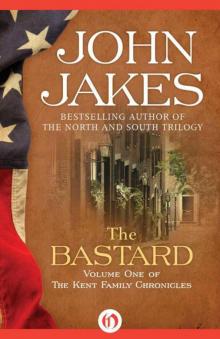 The Bastard
The Bastard The Furies
The Furies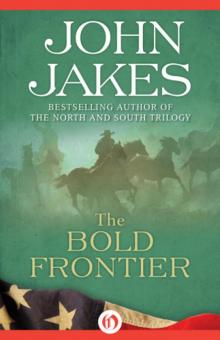 The Bold Frontier
The Bold Frontier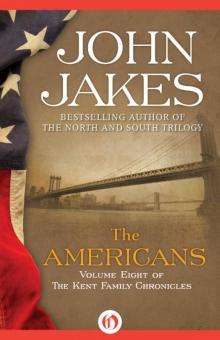 The Americans
The Americans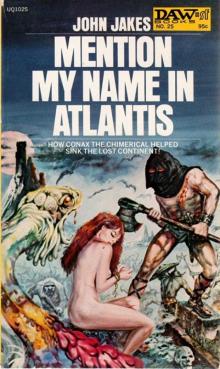 Mention My Name in Atlantis
Mention My Name in Atlantis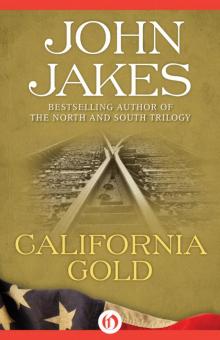 California Gold
California Gold North and South
North and South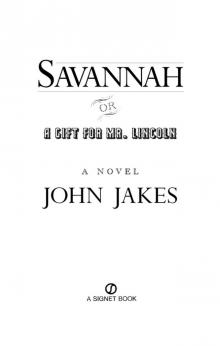 Savannah, or a Gift for Mr. Lincoln
Savannah, or a Gift for Mr. Lincoln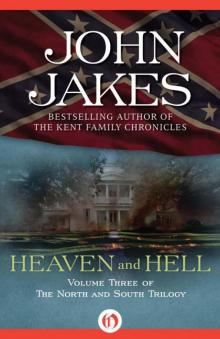 Heaven and Hell
Heaven and Hell Homeland
Homeland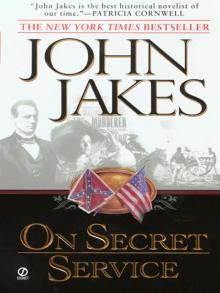 On Secret Service
On Secret Service The Lawless
The Lawless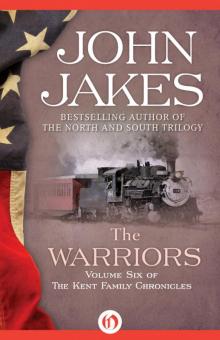 The Titans
The Titans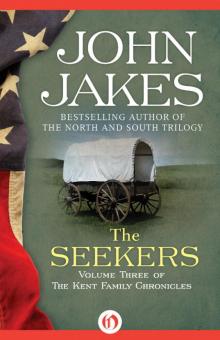 The Seekers
The Seekers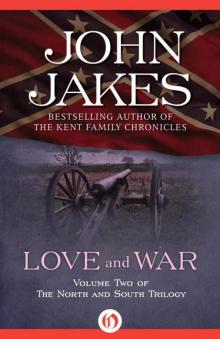 Love and War
Love and War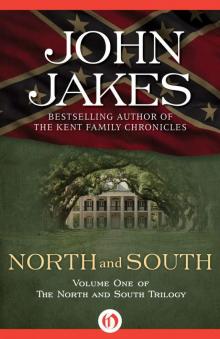 North and South: The North and South Trilogy (Book One)
North and South: The North and South Trilogy (Book One)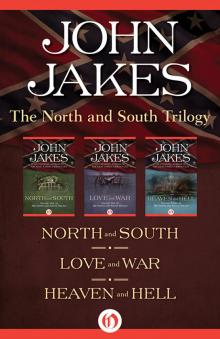 North and South Trilogy
North and South Trilogy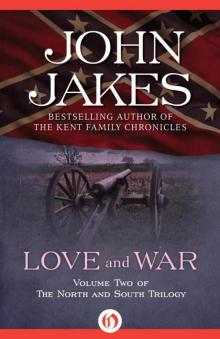 Love and War: The North and South Trilogy
Love and War: The North and South Trilogy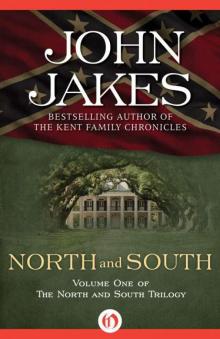 North and South: The North and South Trilogy
North and South: The North and South Trilogy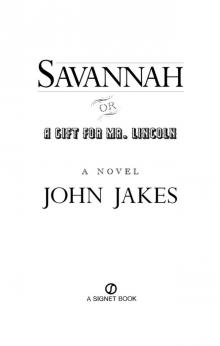 Savannah
Savannah Lawless
Lawless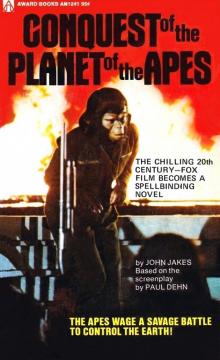 Conquest Of The Planet Of The Apes
Conquest Of The Planet Of The Apes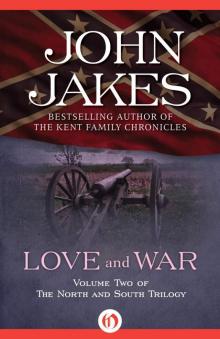 Love and War: The North and South Trilogy (Book Two)
Love and War: The North and South Trilogy (Book Two)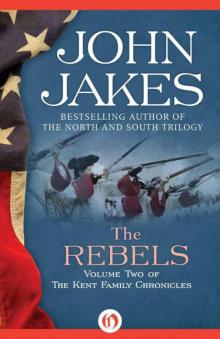 The Rebels: The Kent Family Chronicles
The Rebels: The Kent Family Chronicles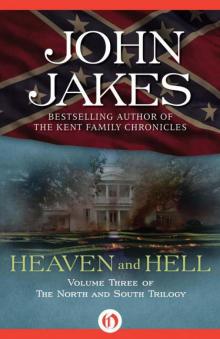 Heaven and Hell: The North and South Trilogy
Heaven and Hell: The North and South Trilogy Planet of the Apes Omnibus 2
Planet of the Apes Omnibus 2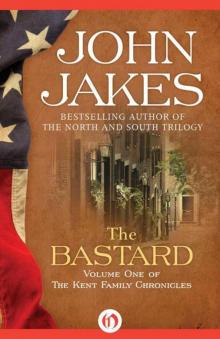 The Bastard: The Kent Family Chronicles
The Bastard: The Kent Family Chronicles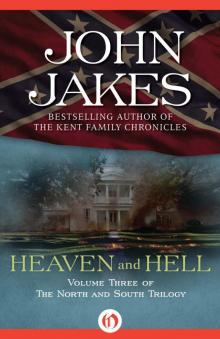 Heaven and Hell: The North and South Trilogy (Book Three)
Heaven and Hell: The North and South Trilogy (Book Three)